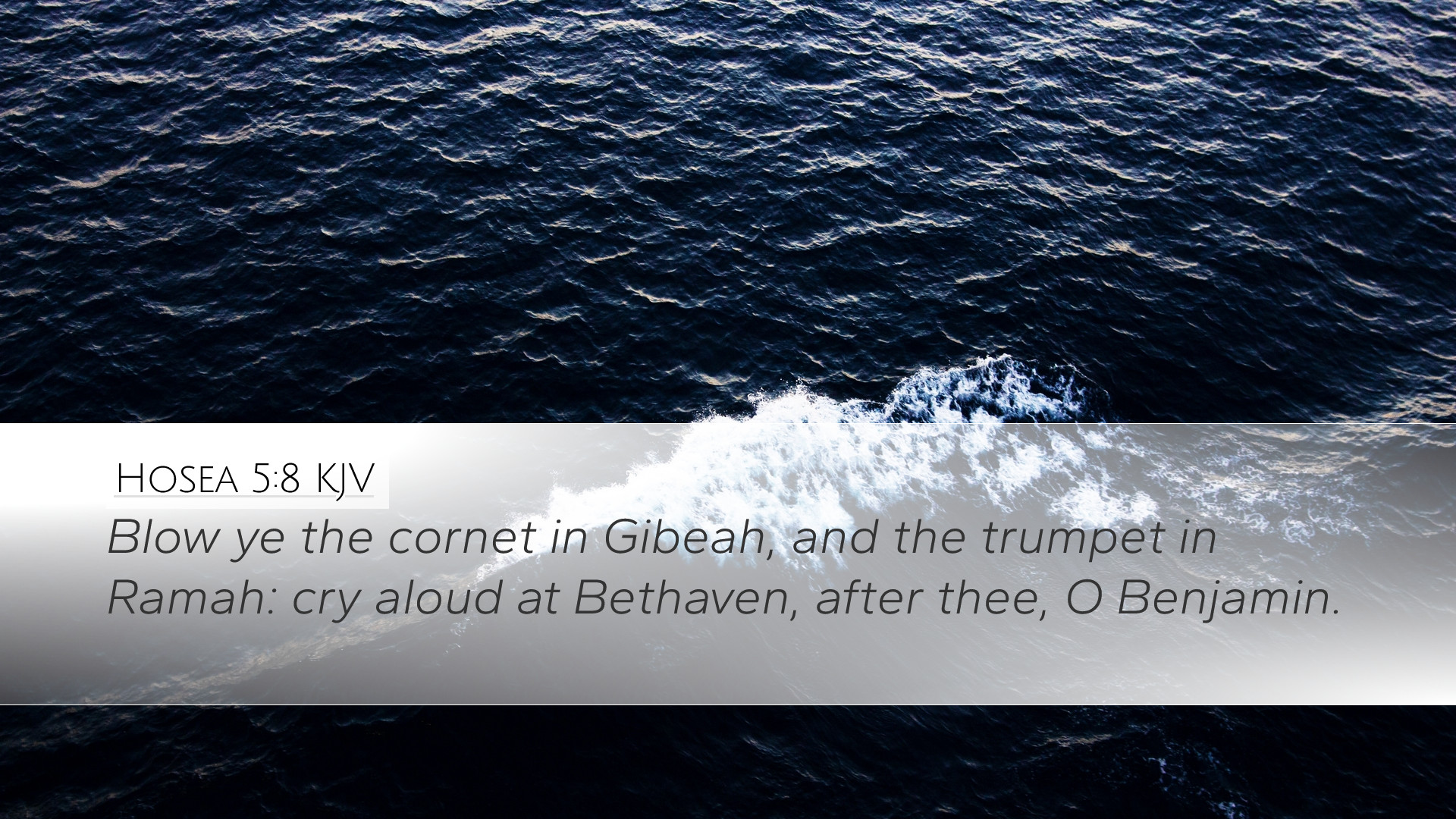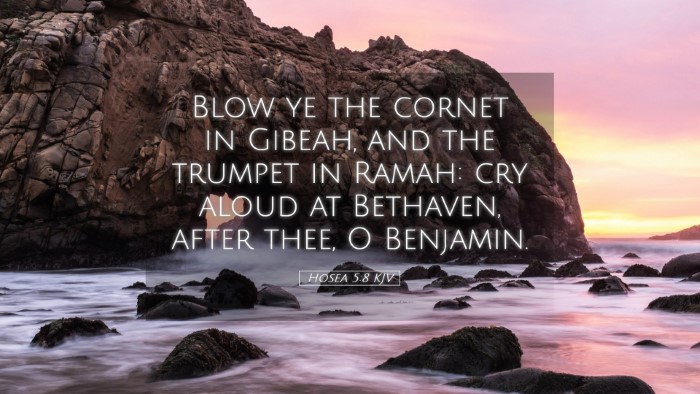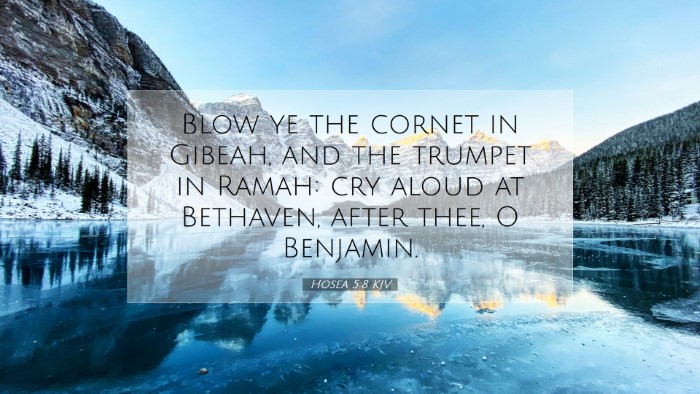Old Testament
Genesis Exodus Leviticus Numbers Deuteronomy Joshua Judges Ruth 1 Samuel 2 Samuel 1 Kings 2 Kings 1 Chronicles 2 Chronicles Ezra Nehemiah Esther Job Psalms Proverbs Ecclesiastes Song of Solomon Isaiah Jeremiah Lamentations Ezekiel Daniel Hosea Joel Amos Obadiah Jonah Micah Nahum Habakkuk Zephaniah Haggai Zechariah MalachiHosea 5:8
Hosea 5:8 KJV
Blow ye the cornet in Gibeah, and the trumpet in Ramah: cry aloud at Bethaven, after thee, O Benjamin.
Hosea 5:8 Bible Commentary
Bible Commentary on Hosea 5:8
Bible Verse: Hosea 5:8 - "Blow ye the cornet in Gibeah, and the trumpet in Ramah: cry aloud at Beth-aven, after thee, O Benjamin."
Introduction
The Book of Hosea provides insights into the unfaithfulness of Israel and the divine call for repentance. In Hosea 5:8, the prophet is commanded to call the people to attention through the blowing of the trumpet in significant places, demanding an immediate response to God's judgment. This verse serves as an urgent warning and illustrates the seriousness of Israel's spiritual condition.
Contextual Background
This verse comes in a context where Israel was deeply entrenched in idolatry and moral decay. The trumpet and cornet were instruments commonly used to signal important events or mobilizations in ancient Israel. The mention of Gibeah, Ramah, and Beth-aven carries geographical and historical significance, reinforcing the urgency of God's message through Hosea.
Insights from Public Domain Commentaries
Matthew Henry’s Commentary
Matthew Henry emphasizes the call to alarm the people of Israel. He notes that the command to "blow the cornet in Gibeah" signifies the need to awaken the people from their spiritual slumber. The use of multiple locations indicates that this is not a localized issue but a national crisis requiring a unified response.
- Sounding the Alarm: Henry points out that the trumpet is a sound of alarm in battle, and the call to the tribes is essential, as they must recognize the impending judgment.
- Geographical Significance: Gibeah, Ramah, and Beth-aven were places closely associated with Israel's history and idolatry. By naming these places, Hosea underscores the depth of Israel’s apostasy.
Albert Barnes’ Notes on the Bible
Barnes provides a more detailed examination of the implications behind the call to blow the trumpet. He interprets this call as an invitation for the people to come together for a communal response to God’s impending judgment. The trumpet serves not only as a sound of alarm but also as a call to repentance.
- Call to Repentance: Barnes stresses the necessity for the nation, particularly the tribe of Benjamin, who is singled out here, to recognize its plight and turn back to God.
- Judgment is Imminent: He notes that the divine judgment is close at hand and thus the urgency in Hosea’s proclamation. It is an appeal for immediate action to restore their relationship with God.
Adam Clarke’s Commentary
Clarke elaborates on the metaphorical use of the trumpet in this passage, indicating that its sound is meant to pierce the hearts of the wayward Israelites. He interprets the verse as a mixture of lament and hope, encapsulating God's desire for the people to return to Him.
- Heart of God: Clarke highlights God's heart behind the judgment, focusing on His desire for reconciliation despite the people's unfaithfulness.
- Historical Reflection: The historical context provided by Clarke helps readers understand that these locations were reminders of Israel’s national identity and the consequences of their turning away from God.
Theological Implications
The theological gravity of this verse extends beyond its immediate historical application. The sounding of the trumpet is a powerful symbol of divine warning. It represents God’s active engagement with His people, calling them back to a covenant relationship. The emphasis on specific locations also suggests that God is aware of the particular sins of Israel and is addressing them directly.
- Covenantal Faithfulness: The verse highlights the importance of faithfulness to God’s covenant. Hosea’s prophetic ministry embodies the character of God who desires faithfulness from His people.
- God’s Justice and Mercy: While God's judgment is pronounced, there is an underlying current of mercy in the call to repentance. This duality reflects God's nature as both righteous and loving.
Practical Applications for Today's Believers
The message of Hosea 5:8 carries rich applications for modern Christians. In a culture that often mirrors Israel's idolatry and moral decay, the directive to ‘sound the alarm’ can serve as a call to vigilance in spiritual matters.
- Awaking from Spiritual Slumber: Just as Hosea calls the people to attention, today’s believers must commit to being alert to their spiritual condition and the cultural influences that may lead them astray.
- Collective Responsibility: The communal aspect of the call implies that believers have a role in encouraging one another towards faithfulness and accountability.
- Repentance and Return: The underlying message is one of hope. No matter how far one has strayed, the call to repentance remains and restoration is possible through Christ.
Conclusion
Hosea 5:8 encapsulates the urgency of the prophetic call during a time of national crisis. It is a stark reminder of the need for repentance and return to God, reflecting the overarching themes of judgment and mercy in Scripture. The combined insights of Matthew Henry, Albert Barnes, and Adam Clarke illuminate the depth of this verse and its relevance for both ancient Israel and contemporary believers. As pastors, students, and scholars engage with this text, they find an invitation to reflect on their relationship with God and respond to His calls for faithfulness.


